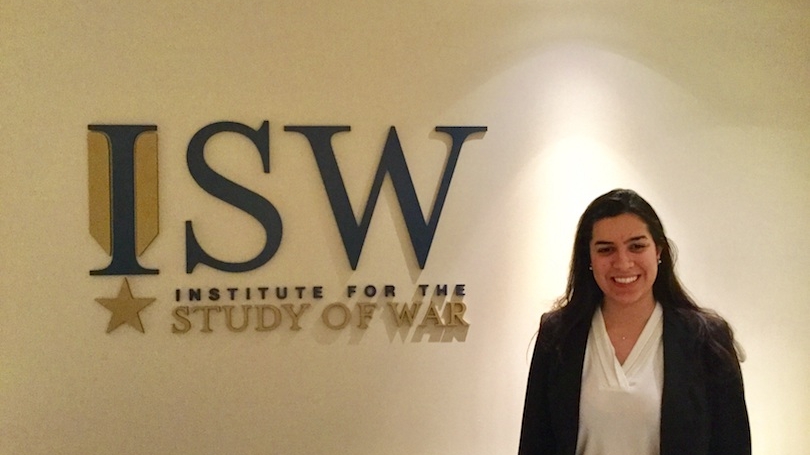
- Public Policy
- Leadership
- Funding
- News & Events
- About the Center
Back to Top Nav
Back to Top Nav
Back to Top Nav
Back to Top Nav
Reem Chamseddine ’17 interned with the Institute for the Study of War for the 2017 winter term. The following is an excerpt from her internship report.
This past winter, I had the opportunity to intern with the Institute for the Study of War (ISW) which is a think tank that researches and analyzes developments in regions critical to American national security and American foreign policy. The mission of ISW is to provide real-time, independent, and open-source analysis of political processes, military operations, and insurgent activity in Syria, Iraq, Afghanistan, and Russia. Additionally, ISW attempts to bridge the military-civilian knowledge gap. ISW research is typically consumed in the defense community, the diplomatic community, and among policymakers.
As an intern at ISW, I conducted research within the Syria portfolio. Specifically, I was responsible for collecting daily political and kinetic events involving the Syrian civil war, from peace talks in Geneva to the advances of the Syrian Arab Army against militant groups. I had to produce a concise, well-sourced document of all significant activities that an executive reader would need to know to make informed decisions. I also maintained and updated a database about political and military actors in the Syrian theater. Such a database, which is now a few years old, will remain a resource for future interns and analysts at ISW to make forecasts and track complex trends.
My understanding of the Syrian civil war, insurgent networks, and tactical military operations has increased significantly because of my internship. The analysts, who are the direct supervisors of the interns, ensured that the interns gained new skills and knowledge over the internship period. We had scheduled sessions that were blocked out solely for learning about our area of research. For instance, within the Syria portfolio team, we had weekly sessions on Syria’s history, regime politics, and territory. I enjoyed these sessions because they felt like actual classes, and I always left having learned something new. Another time, my analyst sent me a few articles about the Syrian conflict and asked me to write up a response. This assignment was designed so I could verbalize my thoughts and knowledge about rebel infighting in southern Syria. My analyst took time out of her busy day to review my response and offer feedback. Even though I didn’t have the expertise that she does on Syria, I always felt appreciated and valued for what I brought to the table.
The small size of ISW creates a collaborative and productive environment. We start every weekday with team-wide meetings. All the analysts and interns gather to discuss items that require cross-team collaboration. For instance, decisions made by the Russian military could very well have an impact on the Syrian theater of war. The morning meetings allowed me to not only learn about other critical regions, but also to share information that I have collected with other teams and with the leadership of ISW.
Overall, my internship reinforced my choice of being a Government major. Tracking the Syrian conflict has exposed me to the complexity of civil war ‒sectarian violence, elite politics, regional aspirations, and international calculations all account for the suffering millions of people. The problem of war is a significant problem in the study of foreign affairs. I am glad to be studying a subject with real-world implications, and I hope to be able to contribute to the field and find ways to mitigate the consequences of war in the future.
Before this internship, I participated in the Rockefeller Center programs, Rockefeller Global Leadership Program and the Management and Leadership Development Program. Both RGLP and MLDP prepared me to succeed in my internship. For example, I learned how to communicate professionally with my supervisor, how to divide up tasks within a team, and how to give presentations. All these skills have been relevant to my internship. Most importantly, I am very grateful to the Rockefeller Center Internships Program for supporting my off-term at ISW. It has been, for all the reasons above, a wonderful and truly rewarding experience.